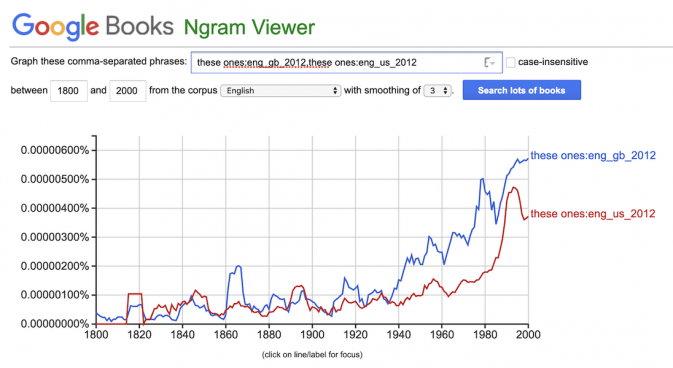(Paraphrased listener question) When my son was in elementary school, I started hearing kids use the phrases “these ones” and “those ones,” and that doesn’t sound right to me. It should be “that one” or “those over there,” not “those ones.” But I’ve also heard other people use the phrases “these ones” and “those ones.” Is that now acceptable English, or even used?
You aren’t the first person to complain about “these ones” and “those ones” sounding wrong, and I’m sure you won’t be the last. So you’re not alone, but there’s no real rule against using those phrases except that sometimes they’re redundant, and redundancy can bother people.
‘These Ones’: Emphasis
To start, the word “ones” can be plural, as in “I like the red ones.” So the plurality isn’t a problem.
And to many people, it even sounds OK to say “these ones” when you modify the word “ones.”
For example, imagine you’re with a friend in a flower shop, and there are lots of different kinds of roses. You could point to a bouquet you particularly like and say, “I like these red ones.” Since you’re pointing, you could just say, “I like these,” but by saying “I like these red ones,” you could be implying that of all the red roses, these are your favorites, or you could just be emphasizing their redness (“I like these red ones”).
Alternatively, if you’re not standing particularly close to the roses, and you point and simply say, “I like these,” your friend could misunderstand and think you mean all the roses in that section.
In other words, saying “these red ones” instead of just “these” adds information for your friend.
‘These Ones’: Redundancy
“These ones” and “those ones” seem to bother people more when there isn’t a modifier like “red” in “these red ones.” When someone says, “I like these ones,” you could imagine “ones” standing in for “roses”: If someone says, “I like these roses,” nobody ever objects (unless maybe they want to get carnations instead), but if someone says, “I like these ones,” it can seem redundant and annoying, probably because the word “ones” isn’t adding information the way the word “roses” does. Most of the time, it feels like you get the same information with essentially the same emphasis from “I like these,” and “I like these ones.” So “these ones” seems redundant. Still, on occasion—for example, when faced with a sea of red roses—“these ones” could suggest a more limited selection than just “these” alone.
I like those roses. (no problem)
I like those ones. (can seem annoyingly redundant)
‘These Ones’: Regional Differences
One interesting point is that in an old Language Log post, the linguist Arnold Zwicky reported finding that it’s mostly Americans who get bothered by “these ones” and “those ones,” and that British people seem to find it “unremarkable.” From a quick Google Ngram search, it does look like “these ones” and “those ones” are a bit more common in British English, and the use of “these ones” and “those ones” has been growing in both British and American English, so you can expect to continue hearing it more often.
‘This One’ and ‘That One’
Another interesting point is that although I’ve heard a slow but steady stream of complaints about “these ones” and “those ones” over the years, I don’t remember ever hearing anyone complain about the similar phrases “this one” and “that one.” You’d think that if people are bothered by a question like “What do you think of these ones?” they’d be bothered by a question like“What do you think of this one?” but they don’t seem to be. And I’ve seen other language commenters say the same thing.
I have no idea why, except that maybe people are getting hung up on the word “one” being plural (“these ones” versus “this one”), but as I said at the beginning, there’s no rule against “one” being plural. We say things like “Which ones would you like?” and “These are the ones Iwant” all the time.
What to Do
If you want to play it completely safe and avoid all risk of annoying anyone, you may want to avoid using “these ones” and “those ones,” particularly if you’re writing for a U.S. audience, but I can’t tell you that “these ones” and “those ones” are grammatically incorrect.
Image courtesy of Shutterstock.





